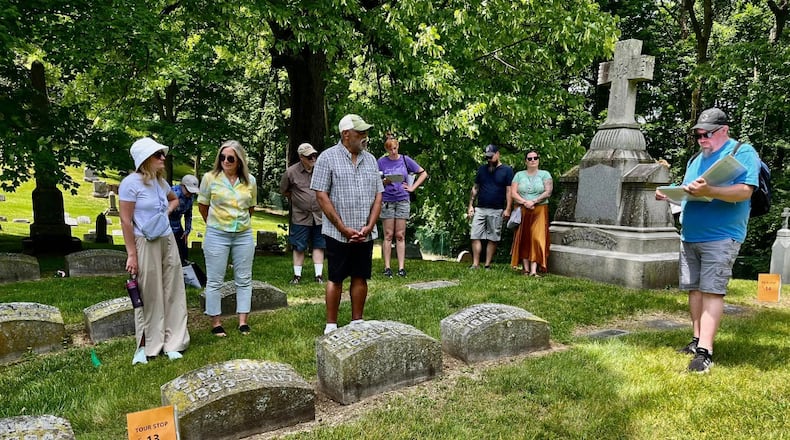2024 also marks the first year for the MCC-OGS cemetery walking tours. These tours are designed to tell stories of the people who built and contributed to Dayton and Montgomery County. They present research on people buried in the cemeteries, while also allowing members a platform to share their independent research.
So far, MCC-OGS has toured two Kettering cemeteries, Calvary Cemetery and David’s Cemetery, and plans on two more this year.
The next tour is at 10 a.m. Saturday, July 27 at Woodland Cemetery and Arboretum (118 Woodland Ave., Dayton). The fourth will be at Dayton Memorial Park Cemetery in October.
The mission of the MCC-OGS has been to inspire, educate and support a diverse community of family historians (i.e. genealogists) based in Montgomery County — though anyone can join, as membership isn’t limited to county residents.
There have been many considerable advancements in genealogical research since the Montgomery County Chapter’s inception 50 years ago — the advent of the internet being a prime example.
In the pre-digital era, a person interested in this research had to go to physical archives and manually search, hoping what they were looking for was on microfilm, and that newspapers were indexed or available; there was a lot of hope involved in those days. But when genealogy chapters were formed, such as MCC-OGS, there was a push to index those pertinent documents — marriage, birth and death records, affidavits, deeds, etc. — opening up their availability as privacy laws allowed.
“Overall, technology has made things more accessible, communication faster and allowed us to network,” said Garry Knight, current MCC-OGS President. “Whether you’re researching for a legal case or researching for genealogy, the steps are the same. It’s just the tools that you use are different now than there were 50 years ago.”
But even with these advancements, research is still a tedious process. Trips to county archives, libraries and cemeteries remain essential — especially if the information has yet to be indexed or digitized — but a significant amount of preliminary research can be done electronically through resources like ancestry.com and familysearch.org.
“I saw a statistic a long time ago that said only 10 to 15% of all the records in the world have been digitized and made available online,” said Erin Harris, the webmaster for MCC-OGS, who works remotely from Colorado. “Even the Montgomery County archives have rooms full of old books … it takes a lot of time and money and straight-up effort to get those digitized and online and searchable.”
Records on living persons often aren’t available to the public until a threshold of time after death, while some aren’t available to digitize at all, due to misplacement or destruction.
Harris cites a running joke that the 1890 Census doesn’t exist because of a fire at the U.S. Dept. of Commerce building, leaving a sizeable gap in many families’ histories. The farther back the research goes, the fewer females are documented. Records directly after the Civil War are also difficult to track down because people were more mobile then.
These situations can lead to what genealogists refer to as a “brick wall,” a research dead end.
Brick walls happen in any number of ways, but a technique called “friends, associates and neighbors” (FAN), also called “cluster research” — a method simplified with search engines — can help.
“You have to expand your search and find other mentions of them,” Knight said. “Instead of focusing on this female relative, go to their siblings… go through aunts and uncles to find what you’re looking for.”
There is this idea that genealogy is a retired person’s hobby — perhaps because of the time it takes, and the retired have the time. But Harris says technology has broadened the appeal, meanwhile simplifying the process.
“The focus is getting younger generations into genealogy,” Harris said. “It can open up things about your past and what you didn’t know, family history, American history, world history.”
There are perks to being a family historian in the digital age — not to mention the wonders that a vial of saliva can tell about your roots — but computers are just another specialized tool in the genealogist’s arsenal. Social media will likely play a bigger role in genealogy’s future, as well.
What this all comes down to is what questions you want answered. When questions get answered, it may lead to more questions. The more you know about history, the more you can contextualize the present.
“It’s a puzzle,” Knight said. “You start out knowing things and then you fill in the gaps.”
More details
For more on the Montgomery County Chapter of the Ohio Genealogical Society or information on how to become a member, visit mcc-ogs.org. MCC-OGS also offers online Zoom meetings for those who cannot otherwise attend the monthly meetings or events.
The group’s annual summer picnic is at noon July 13 at Christ United Methodist Church, 3440 Shroyer Road in Kettering. Everyone is encouraged to bring their favorite side dish, dessert, or drinks. The chapter will provide chicken. RSVP to Publicity@MCC-OGS.org required.
About the Author

